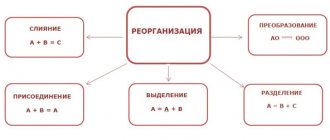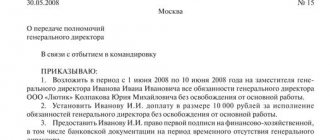Notifying employees
After making a decision to liquidate the organization and dismiss all employees, including the manager, the employer must officially notify the local authority of the State Employment Service in writing. The notice must be sent two months before the start of the liquidation process and termination of the employment relationship.
Along with this, notices of the planned termination of cooperation must be issued within two weeks to all employees of the organization, without exception.
Their form is arbitrary and is developed by the company’s HR department.
How to properly prepare documents
Documenting the dismissal of employees, especially the director, becomes an important step in the cessation of the existence of an enterprise. Responsible filling out of papers and forms will help minimize labor disputes.
The decision on liquidation is accompanied by the creation of a liquidation commission. Its work plan is approved at the time of creation; one of the points is the developed scheme for dismissing the director upon complete liquidation of the enterprise.
In fact, the creation of a liquidation commission means the termination of the director’s exercise of powers.
Notification
The manager, who is an employee, must be notified of the upcoming termination of the employment contract in the event of liquidation by decision of the founders 60 days in advance, and in case of bankruptcy proceedings - 1 month in advance.
A strict sample has not been developed; a mandatory requirement for it will be the availability of information:
- about the date of the upcoming dismissal;
- about the reasons;
- about the amount of payments due;
- about the date of receipt of the document.
The exact date of liquidation of the enterprise is set after notification of the upcoming event to all employees, including the director, against signature. The notification can be drawn up in the form of an order, which the employee reads in writing.
If the person in respect of whom the document was drawn up is absent from the workplace, the notification is sent by registered mail to the place of residence. The refusal to sign must be certified by drawing up a corresponding act, certified by the signatures of witnesses.
The document is drawn up in two copies. One is given to the employee, the second, with a receipt stamp indicating the date, is stored in the organization.
Dismissal
The fact of making a decision to dismiss the director is reflected in the Minutes of the general meeting of the LLC on the closure of the enterprise. The creation of a liquidation commission formally terminates the powers of the manager. A competent and clearly defined process for terminating an employment relationship is based on legislation.
The stages of dismissal following notification of the upcoming event are as follows:
- signing the order;
- familiarizing the employee with it;
- calculation;
- filling out the labor report;
- issuance of a work book.
The procedure may vary depending on special circumstances.
The dismissal of a director who is the sole founder of the company looks different. It happens both easier and faster. The basis for dismissal will be one’s own desire, or in more rare cases, an order to dismiss. The order is signed by the liquidator, who is appointed by the founder. Often this is the same person.
The dismissal of a director during the liquidation of an LLC is accompanied by a corresponding entry in the work book. Column 3 most often indicates “Dismissed due to the liquidation of the organization, paragraph 1 of part one of Article 81 of the Labor Code of the Russian Federation.”
https://youtu.be/4dgoS8An6bE
Grounds for termination
In the process of terminating the activities of the enterprise, one should be guided by the legislative norms governing the work of organizations. According to them, issues relating to dismissed personnel, including the director, are the responsibility of the liquidation commission.
terminate an employment contract with a manager on the following grounds:
- agreement of the parties;
- employer initiative;
- expiration of the contract;
- decision of an open meeting of a limited liability company.
Dismissal options
The dismissal of a director related to the liquidation of an LLC due to bankruptcy has its own characteristics:
- After the appointment of a bankruptcy trustee by the Arbitration Court, the director transfers powers and documentation to him within three days.
- The period allotted for notifying all employees is reduced to one month. The notification is carried out by the bankruptcy trustee. The director who has actually transferred his powers is subject to dismissal along with the employees after 30 days.
- At the initiative of the bankruptcy trustee and with the consent of the head of the organization, his position is retained until the entry about the enterprise is deleted from the Unified State Register of Legal Entities.
- Payments to employees must be made within a month. Then it will be almost impossible to implement.
In case of bankruptcy of an organization, a director can either be immediately removed from office or retain his powers until the LLC is completely liquidated. The opinion of the bankruptcy trustee becomes decisive.
Termination of powers at the director's own request occurs after sending an application to the liquidation commission. After agreeing on the issue with the chairman of the commission, an order is issued. The employee loses the right to compensation payments.
Dismissal by agreement of the parties gives the right to receive compensation if it is provided for in the employment contract or the Charter of the enterprise. In this case, there is no need to notify the employee and observe a period of 2 months before the termination of the employment contract.
Important nuances
All conditions that relate to both liquidation and the process of terminating relations with the manager must be enshrined in the Charter of the enterprise. But the rules contained in it cannot contradict the norms of Russian legislation.
Dismissal of employees due to the completion of production activities of an enterprise has a number of features:
- The founders of the company or a government body with sufficient powers to make decisions on closing the company appoint a special liquidation commission. Its task is to carry out actions upon completion of the organization’s work in accordance with a pre-prepared plan, part of which is the procedure for terminating cooperation with both the director and all other personnel.
- When terminating employment contracts with all employees - from ordinary specialists to managers, the legislation provides for an extended notice period. It must be at least 2 months before the liquidation of the organization. The exception to this rule is seasonal workers and employees with whom a two-month contract has been concluded.
- Notice of upcoming dismissal must be drawn up in two copies. One of them is given to the official, and the second, with the employee’s personal signature confirming familiarization, remains with the employer. In addition, the regulations provide for the possibility of collective notification of workers. In this case, each specialist must sign that he has been officially acquainted with all the required information related to the liquidation of the enterprise.
Providing timely notice to employees of upcoming layoffs is an important part of the company closure process.
Violation of this clause may result in administrative liability being brought to the responsible persons.
When should the chief accountant be fired if liquidation of the LLC is planned?
A frequent question in the practice of lawyers is when to fire an accountant during the liquidation of an organization. Typically, contracts with employees are terminated during the formation of the liquidation balance sheet. But there is documentation that the chief accountant must sign. Such documents include the liquidation balance sheet itself and the order to close a bank account. However, the manager also has the right to sign, so the problem of dismissing the chief accountant of the company during its liquidation is removed: the LLC’s documentation can be endorsed by the director.
It is more difficult in the case when the chief accountant is needed during the liquidation process. Often it is he who, together with the director, prepares the liquidation balance sheet, deals with the calculation of employees, and takes care of paying off the company’s debts through the sale of assets. In this situation, several questions become relevant:
- during what period is it legal to dismiss the chief accountant during the liquidation of an LLC;
- should he be a member of the liquidation commission;
- how his services will be paid for.
The most successful two-stage option:
- the chief accountant is fired along with everyone else, he receives pay and compensation
- draw up a fixed-term employment contract with the chief accountant as a member of the liquidation commission, in this document they stipulate the amount of wages, the amount of work, and the payment regulations.
Procedure
Termination of an employment agreement with a manager upon closure of an organization must be done competently and with clear execution of all necessary documents. The procedure consists of the following steps:
- The founder or government agency makes a decision on the termination of the enterprise and the dismissal of its employees, including the manager. The document must indicate the basis for termination of employment contracts.
- Two months before the end of the relationship, notice must be sent to the director that he will be dismissed.
- The dismissed manager signs an order to terminate the relationship.
- All compensation established by law is paid.
- The work book is filled out.
The process of dismissing a director who is an employee is quite simple, but it still requires accuracy and strict compliance with the law. Any mistake may cause a former employee to turn to the courts for protection against unlawful termination of an employment agreement.
General procedure for dismissing employees during liquidation
Article 81 of the Labor Code of Russia regulates the procedure for dismissing employees during the liquidation of an enterprise, and also provides for additional compensation payments for them.
The procedure for closing an organization is as follows.
[1]. The authorized body makes a decision to liquidate the company. A corresponding resolution can also be adopted in court.
[2]. The manager issues an order to dismiss staff members from their positions. This internal document is drawn up on the basis of a decision made by the employer (Form T-8).
[3]. The procedure for dismissal during liquidation of an enterprise requires the employer to submit data about each full-time employee to the local employment service.
These documents must indicate the following information: position, profession, salary, specialty.
Federal legislation provides for a deadline for submitting data - 2 months before dismissal.
The form that is submitted to the employment service is approved by Decree of the Government of the Russian Federation No. 99 of 02/05/1993.
[4]. Dismissal during liquidation requires the employer to submit a corresponding notice to the local trade union. He must transfer the data no later than 3 months before the start of the liquidation procedure.
[5]. If the company has an employee registered with the military, the manager must send a corresponding notification to the local military registration and enlistment office. The form of such a document was approved by the General Staff of the Armed Forces of the Russian Federation on April 11, 2008.
[6]. Each employee must be personally familiarized with the order, which he signs in the appropriate accounting register. For this purpose, federal legislation sets a deadline - 2 months before the completion of the liquidation procedure.
[7]. On the last working day, the employer must issue work books to all employees, which contain notices of dismissal (the basis is clause 1 of Article 81 of the Labor Code of the Russian Federation).
On the same day, final settlement of wages and other payments must be made with employees.
[8]. If funds were withheld from a company employee based on a court decision, the manager notifies the local bailiff service about the liquidation of the company.
He must give them, in addition to the writ of execution, an employment agreement and other documents relating to this issue.
[9]. If alimony was withheld from the employee, the employer informs the recipient of his dismissal within three days (Article 111 of the Family Code of the Russian Federation).
[10]. The mass dismissal of workers is carried out in several stages. First of all, contracts with production workers are terminated. After this, labor relations with economic services and the administrative apparatus are terminated.
Labor relations with specialists involved in the liquidation procedure are terminated last.
Special cases
In some cases, the dismissal of a manager requires compliance with special rules. Such situations arise, for example, in the event of bankruptcy of an organization or if the director is also the founder of the enterprise.
Sole founder
When the only founder in an organization is the director, then his dismissal during liquidation is much easier than terminating an employment agreement with an employee holding a similar position. The procedure is simplified for reasons such as:
- the manager has the opportunity, at a time convenient for him, to make a decision to end the production activities of the organization;
- since the director is the only founder, he can appoint himself as the liquidator of the company;
- dismissal is carried out at one’s own request or on the basis of an order from the manager;
- An entry made in the work book must be certified by the director.
Despite the fact that in this case the director simultaneously represents both the dismissed employee and the one who dismisses him, violations of the procedure for ending cooperation are unacceptable. All its stages must strictly comply with established legal standards.
Enterprise bankruptcy
In the event of dismissal of the general director during the liquidation of the organization due to bankruptcy, dismissal from office is carried out after the introduction of bankruptcy management. Responsibility for this procedure falls on the bankruptcy trustee, who is appointed by the arbitration court. The manager transfers his powers to this person within three days, as well as all the necessary documents.
The time frame for notifying the organization’s personnel about the upcoming termination of employment contracts is reduced, and the dismissal of the director is carried out as follows:
- After the arbitration court makes a decision, the manager is given 30 days to notify all employees of the dismissal. The director should be dismissed on a general basis, despite the fact that he actually stopped working much earlier.
- The bankruptcy trustee may retain the director's position until the company is excluded from the Unified State Register of Legal Entities.
It should be noted that even if an enterprise is declared bankrupt, one of its priorities is full settlement with employees.
But still, the organization cannot be responsible for paying wages if the amount of debt exceeds its existing assets and liabilities.
Company reorganization
In this case, the peculiarities of the termination of cooperation are mainly related to the fact that the legal successor of the organization usually wants to place its employees in leadership positions. In the event of a merger of a subsidiary and a parent company, the general director of the first organization loses his powers due to the fact that his functions are taken over by the management of the resulting enterprise.
In an organization, the general director is an executive, but for his illegal actions he may incur both administrative and criminal liability. When this person is fired due to the reorganization of the company, administrative responsibility passes to the new management. An employee who previously held the position of director is not exempt from criminal liability.
The decision to dismiss and replace a manager during the reorganization of an enterprise is made by the founders. Legislative acts do not prohibit a person from retaining their position, as well as continuous work experience.
Other dismissal options
In some cases, the director may use other ways to end cooperation with the founders of the enterprise, but only on the condition that he is an employee. Like any other specialist, a manager has the right:
- apply for resignation of your own free will;
- resign by agreement of the parties.
If the director decides to leave of his own free will, then he must submit an application to the chairman of the liquidation commission or the founder. But it should be noted that in this situation no compensation is paid. If the termination of the employment contract occurs by agreement of the parties, then the employee may receive compensation specified in the employment contract.
Who has the authority to remove a manager from office?
In case of bankruptcy, the manager is dismissed (Article 278):
- meeting of founders;
- external manager;
- board of directors;
- by resolution of the authorized body of the legal entity;
- general shareholder meeting (No. 208-FZ);
- owner of the liquidated organization.
The General Director is subject to dismissal from office by decision of the constituent meeting. In case of bankruptcy, governing powers are transferred to the insolvency practitioner. During liquidation, the dismissal of a director is legally possible while he is on vacation (regular, maternity, sick leave).
Termination of powers
The conditions for terminating the powers of a manager directly depend on the method of liquidation of the enterprise. For example, during the decision-making process, the director has the right to submit an application indicating that he is vacating the workplace at his own request.
After this, the founder has a month to make a decision on the issue raised. Usually the application is approved, and all necessary entries are made in the work book. The date of completion of the document is considered the moment of loss of authority.
When, when forming a liquidation commission, its head takes upon himself all actions to manage the enterprise, then a special order of the commission can be considered the basis for terminating the contract with the head. Once this document is signed, the director's work officially ends.
Dismissal of the director - the sole founder
If we consider the sphere, companies can be created in which the sole founder is the director. The legislator allows such a person to draw up all the necessary documentation in his own name and manage the company. In this case, the sequence of actions when terminating relations with the director will look like this:
- At the initial stage, a decision is made that it is necessary to terminate the company's activities. Then the composition of the commission involved in the liquidation process is appointed.
- Notifications are sent to the fiscal authority.
- An order is formed to terminate the employment relationship with the director. The sole founder is responsible for the drafting; he issues an act according to which he dismisses himself.
- A corresponding entry is made in the labor record.
- Then the activities of the liquidator begin. The main direction is representing the interests of the company in various bodies related to liquidation. He carries out such activities until the data about the company is deleted from the Unified State Register of Legal Entities.
We invite you to familiarize yourself with what documents can confirm your work activity
To clarify this issue, we need to consider a specific example. Citizen Sidorov is the sole founder of the company; on May 25, 2020, he decided that it was necessary to liquidate the company. In confirmation of this, he draws up a corresponding act.
On May 26, Sidorov sends a notice to the Federal Tax Service and fires himself. At the same time, on the same day the citizen makes the necessary entries in the labor record. This suggests that from May 27 he will act as liquidator.
Work record and compensation
Since the work book is the main document of a working person, the information entered into it is very important. It is the employment record that serves as official confirmation of the manager’s dismissal. At the same time, it must be done with an indication of the relevant documents, decisions and legal norms.
Compensation payments related to the termination of an employment agreement with a manager due to the liquidation of the organization must be established in the contract concluded with the employee, but they also cannot contradict the legislation of the Russian Federation. These payments vary depending on the reason for dismissal and the type of relationship between the director and the company:
- An employee receives severance pay equal to the average monthly salary. In addition, due to the need for employment, he can count on such payments over the next two, sometimes three months.
- The only founder who held the position of director has the right to receive severance pay, which is associated with the liquidation of the enterprise. If the company's budget does not allow such a payment, then the employee can resign of his own free will. This measure will free the organization from additional costs.
- If a director is removed from work due to the bankruptcy of an enterprise, severance pay is not paid to the director.
There are several reasons for liquidating a company. This usually happens at the request of the founders or due to a difficult financial situation, that is, bankruptcy. Dismissing staff is one of the most difficult moments. Any violation of laws may result in lengthy legal proceedings, as well as additional costs.
Regulations
The liquidation procedure of an enterprise must be carried out in strict accordance with the standards provided for by current legislation. If the company is closed incorrectly and employees are fired, the owner of the enterprise may be held liable in accordance with Art. 199 of the Criminal Code of the Russian Federation. To prevent the occurrence of negative consequences, the founder or chairman of the meeting of founders must be guided by Federal Law No. 14 and Art. 92 Civil Code of Russia. In this case, the liquidation procedure of the company can be carried out:
- upon a voluntary decision of the sole founder or meeting of owners;
- by court decision. Most often, forced closure is carried out when the organization has a large number of debts that will be impossible to pay.
In case of voluntary liquidation, the date of dismissal will be determined by an additional agreement with the director. When a meeting of shareholders is held and a decision is made, the order of dismissal and further entries in the labor record will be assigned to the liquidator, that is, the person responsible for this process.
The dismissal of the general director can be either his own initiative or the initiative of the employer.
According to Article 279, compensation to the director is assigned in the form of a minimum amount for three months based on the calculation of the average salary per month. In case of early termination, the rule regarding additional compensation for unworked time applies.
It is worth considering that compensation payments must be timely and made in full. This is established by Article 140 of the Labor Code of the Russian Federation. But if this is not possible, you can enter into an additional agreement and make staged payments.
The procedure for terminating directorships is regulated by law. The main document that addresses this issue is the Labor Code of the Russian Federation (LC RF).
- Article 81 of the Labor Code deals with the issues of termination of an employment agreement.
- The grounds for the absolute termination of the powers of an individual manager are covered in Article 278.
- Article 69 No. 127-FZ “On Insolvency” considers the removal of a director from duties by an arbitration court.
- Article 62 of the Civil Code of the Russian Federation regulates the responsibilities of persons participating in liquidation.
- Article 57 No. 14-FZ “On Limited Liability Companies” considers issues related to the liquidation of an LLC.
- No. 127-FZ “On Insolvency” helps to understand the nuances.
Also, important information is provided in Articles 176, 140, 142 of the Labor Code. In addition to labor legislation in general, the internal acts of the company, the introduction of certain additional conditions into its charter and employment contract are also important.
What payments are due to the manager?
Upon dismissal during the liquidation of an LLC, the director of the company is entitled to receive appropriate payments. In this case, the fact on what basis he works in the company plays a role.
If the director dismissed due to the liquidation of the LLC is an employee, he is subject to the information reflected in Articles 181 and 279 of the Labor Code of the Russian Federation and is entitled to payment of severance pay.
The documents indicate that the minimum payment upon liquidation must be equal to 3 times the average monthly salary of the employee.
The maximum amount of payments of this nature is not regulated. Therefore, the employer, if possible, can increase it.
If the director is the only founder of the LLC, he is not subject to the provisions of Article 279 of the Labor Code. In this case, he can formalize his dismissal at his own request, in connection with liquidation. You can also be guided by the information reflected in Article 181 of the Labor Code of the Russian Federation.










